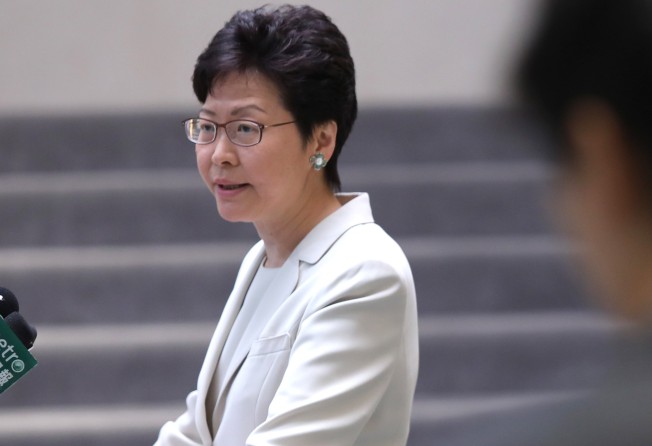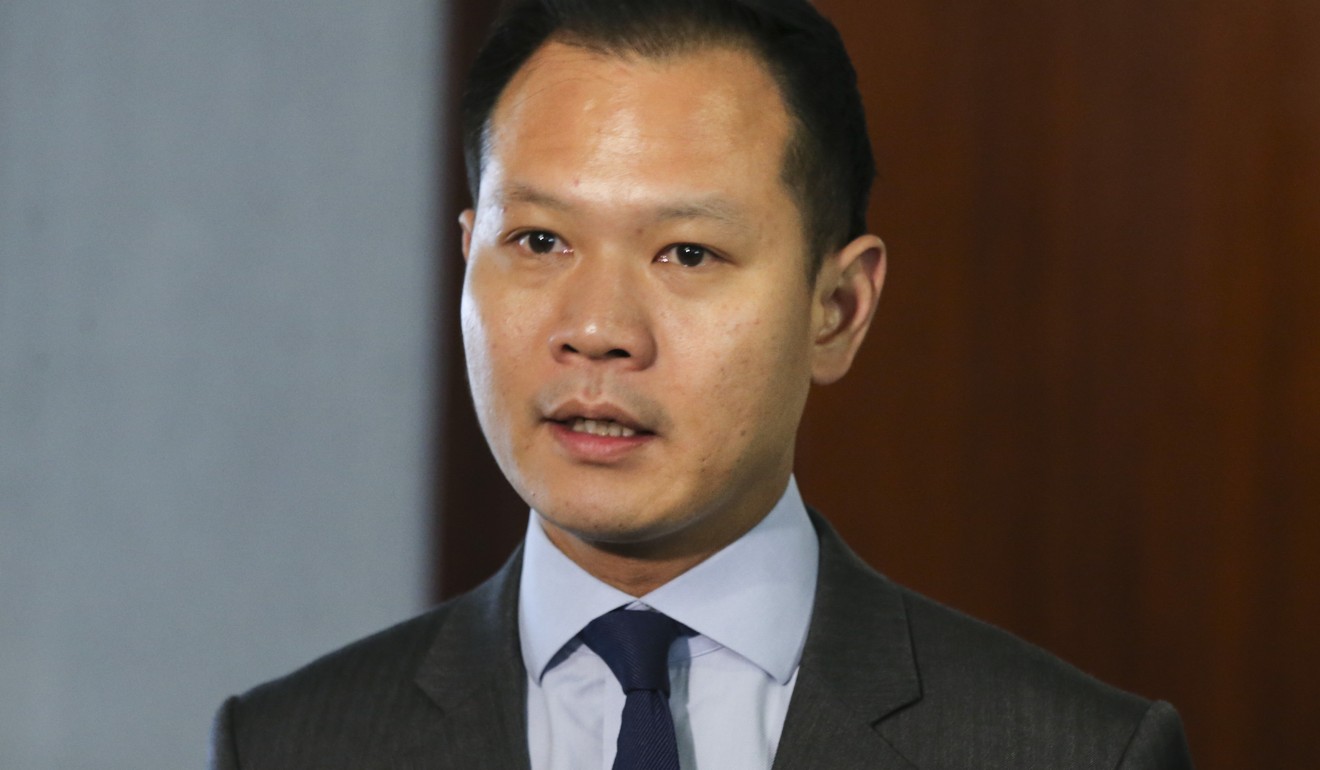Hong Kong needs national security law but only when time is right says Carrie Lam, after top Beijing official says Andy Chan’s pro-independence speech showed city’s ‘inadequacies’
After separatist’s address to Foreign Correspondents’ Club, Beijing’s head of Hong Kong affairs, Zhang Xiaoming, gives strongest official warning yet on the city’s obligation to enact Article 23

Hong Kong Chief Executive Carrie Lam Cheng Yuet-ngor has reaffirmed the need to introduce a national security law, but said there was “no particular timetable” for its implementation.
Lam was speaking a day after Beijing’s head of the city’s affairs said the actions of an independence advocate and the journalists’ club that gave him a platform had exposed Hong Kong’s “inadequacies” to uphold national security.
Reiterating her position on the thorny issue as she returned from Beijing on Thursday, Lam said: “I do not have any particular timetable. I have reiterated that the SAR, the government and myself are obliged to uphold national security, under Article 23 of the Basic Law and local legislation should be enacted to uphold national security.
“This must be done, but it’s also a matter of ensuring [the law] gets passed. So we must find the right time and create a good atmosphere to legislate.”
Lam was speaking after Zhang Xiaoming, director of the State Council’s Hong Kong and Macau Affairs Office, dropped the strongest official warning yet on the city’s obligation to enact the law.
“This incident has reminded us we have to reflect and review Hong Kong’s inadequacies in protecting national security,” Zhang said on Wednesday, a day after Hong Kong National Party (HKNP) leader Andy Chan Ho-tin gave a pro-independence speech at the city’s Foreign Correspondents’ Club (FCC).
But Zhang stopped short of urging Hong Kong to get moving on enacting Article 23 of the city’s mini-constitution, the Basic Law, which – among other things – demands Hong Kong “prohibit any act of treason, secession, sedition, subversion against the Central People's Government”.
Lam said on Wednesday she would act on it when the time was right, as half a million people took to the streets to oppose the last attempt to introduce the controversial legislation in 2003.
If it’s against the law, why didn’t police make arrests at the very beginning? Obviously [Zhang] is forcing the government to use the law against me
“You may also consider this question,” was Zhang’s cryptic reply when asked by reporters in Beijing if it was time for national security legislation.
The director was speaking after the first meeting of a working group to lead the development of the “Greater Bay Area” project, which Lam also attended.
Zhang referred to a speech by President Xi Jinping in Hong Kong last July, in which he called for the implementation of the constitutional order of the Chinese constitution and the Basic Law. The speech also urged the Hong Kong government to “improve and complete” systems related to its mini-constitution.
“This has become a direction that we, the Hong Kong government and different sectors in Hong Kong have to work hard towards,” said Zhang, a former Basic Law Committee member who currently works under Vice-Premier Han Zheng, the state leader ultimately in charge of matters concerning Hong Kong and Macau.
During his talk on Tuesday at the FCC in Central, Chan denounced China as an empire that was a threat to all free people in the world and insisted independence was the only solution for the city. He also called on foreign powers such as the United States and Britain to step in and help Hong Kong.
Police have recommended the HKNP be banned for posing an imminent threat to national security, while the club’s decision to invite him for a talk has been condemned by both Beijing and the local government.
The club refused to cancel the controversial event, citing the need to allow all sides to have their say for the sake of free speech and freedom of the press.
But Zhang censured both Chan and the FCC in strong language, accusing the 27-year-old activist of committing a crime under Article 9 of the Crimes Ordinance, which covers sedition, and the club of assisting him in committing the offence.
“The HKNP and people, including Chan, have plotted, organised and carried out activities with seditious intention – they want to break up the nation,” Zhang said.
As the HKNP was not a registered society, Zhang argued, all its actions were illegal. And the FCC, he said, had “aided” Chan’s seditious intention, thus also breaking the law.
“[The club] knows Chan and HKNP’s motives, but it ignored the Office of the Commissioner of the Ministry of Foreign Affairs and SAR government’s repeated advice. It stubbornly invited Chan to give a speech at the FCC,” Zhang said.
Lam followed up by declaring her government “cannot compromise” its constitutional duty in protecting the nation’s security, sovereignty and integrity.
While it was her government’s duty to enact national security laws, Lam said, the “relatively controversial” move would have to be made after considering public opinion.
“After I took office, people think Hong Kong has become calmer, but when someone brings up a conflict, it again leads to division in the society,” Lam said.
She added her administration would act in accordance with the law in handling separatism.
“If the bottom line that is the law has been breached, we will take action,” Lam said.
While she slammed Chan for “breaching” the bottom line of morals and responsibility, she did not mention whether Chan had committed a criminal offence, as Zhang suggested.
Chan saw Zhang’s accusation against the FCC as “direct pressure” on local and foreign media, “essentially telling them they could not speak to independence forces”.
“If it’s against the law, why didn’t police make arrests at the very beginning? Obviously [Zhang] is forcing the government to use the law against me,” he said.
A police source told the Post that the force would stick to its recommendation to ban the HKNP only under the Societies Ordinance, but was silent on whether laws related to sedition or secession could be used against Chan or the FCC over Tuesday’s event.
Executive councillor Ronny Tong Ka-wah, who earlier on Wednesday suggested Chan had not committed any criminal offence, said later that Zhang’s claim had legal weight.
“According to the wording [of the ordinance], it is possible,” Tong said, but he noted that bringing a charge of seditious intention would require written consent from the city’s justice minister.
Ip Kwok-him, a local delegate to the National People’s Congress, said the FCC involvement had added pressure to the government on the enactment of the national security law.
“Beijing is very concerned about the issue. As a matter of fact, it is hard to say the government has no pressure to get the job done,” he said, adding that the government had yet to fulfil its constitutional responsibility in the past two decades since the city’s handover from British to Chinese rule.
And Tam Yiu-chung, the city’s sole representative to Beijing’s top legislative body, said the central government would never openly tell the government to enact Article 23.
“But it has stated, expressly or implicitly, the need to do so,” he said. “It would be better if the government could finish the legislation in this term. It still has four years.”
But legal sector lawmaker Dennis Kwok said that even with national security laws in place the Hong Kong government “could not turn a blind eye to freedom of speech and press”.

“Legally speaking, Chan and the FCC were by no means inciting violence, so I find it puzzling. What law did they break?” Kwok said.
And John Reading, a former deputy director of public prosecutions who helped draft the Article 23 bill in 2002, said Hong Kong currently does not have a sedition law and merely speaking of independence was not in breach of any law.
“If we look at the Crimes Ordinance, it still says about the queen,” Reading said, adding that the law does not automatically allow for the powers of the queen to be transferred to China upon the return of Hong Kong in 1997. This was precisely why Article 23 was needed, he said.
Meanwhile, FCC vice-president Victor Mallet declined to respond to Zhang’s remarks, saying the club’s board “has decided it would not make further comments” unless things changed.
Mallet said on Tuesday the talk was entirely lawful and the club would “continue to invite people of all opinions on all subjects”.
Additional reporting by Christy Leung